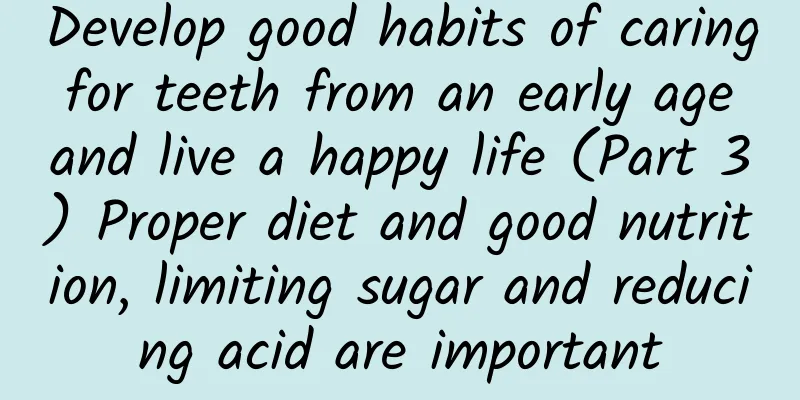Develop good habits of caring for teeth from an early age and live a happy life (Part 3) Proper diet and good nutrition, limiting sugar and reducing acid are important

|
At present, dental caries in children in my country has the characteristics of early onset, large number of teeth affected by dental caries, rapid development of dental caries, and wide range of dental caries, which affects children's chewing and digestive functions, has a serious impact on oral health and overall growth and development, and may also become a risk factor for certain systemic diseases. As a guardian of children, you can help children eat properly and protect their oral health. For infants under 3 years old, dietary recommendations include the following: Breastfeeding is recommended within 6 months, because breast milk contains sufficient energy and nutrients, and breastfeeding has obvious advantages for infants to learn to breathe, suck and swallow correctly, so breastfeeding is recommended. As the baby grows older, breastfeeding should be progressed from on-demand feeding to regular feeding, gradually reducing the number of feedings, avoiding the habit of falling asleep with the nipple or pacifier, and reducing the number of night feedings. After 6 months, it is encouraged to continue breastfeeding and gradually add complementary foods, maintaining a reasonable feeding interval. When adding complementary foods to infants over 6 months old, sugar intake should be reduced, soft drinks and desserts should not be given to infants, and infants should not be allowed to hold sweet milk or sweet drinks in their mouths for a long time. In addition, caregivers should avoid using their own mouths to touch the pacifier to check the temperature when feeding, do not kiss infants mouth-to-mouth, do not feed infants food that they have chewed, and do not share tableware to avoid spreading caries-causing bacteria in the mouth to infants through word of mouth. Dietary recommendations for children over 3 years old include the following aspects: Scientifically identify sugars and stay away from added sugars. Sugars are divided into non-free sugars and free sugars. Non-free sugars are less harmful to the body and refer to fructose naturally present in fresh fruits, sugars in vegetables, lactose in milk, and starch in cereals and potatoes. Free sugars are more harmful to the body and are often divided into two types. One is the sugar present in pure fruit juice, concentrated fruit juice and honey. Although it often gives people the impression of being "natural" and "healthy", it is also a free sugar. The other type of free sugar refers to sucrose, glucose, fructose and syrup added to food during food production, preparation and processing, also known as added sugar. This type of added sugar is not only found in sweet snacks such as beverages, candies, and cakes, but may also be hidden in "non-sweet" processed foods, such as ketchup, yogurt, coffee, puffed foods, etc. (Figure 1). Figure 1 It is important to eat sugar scientifically. Although sugar is a recognized risk factor for tooth decay, it is also one of the main nutrients for humans and the main source of energy for the human body. Therefore, it is very important to promote scientific sugar consumption. The World Health Organization recommends that infants under 1 year old do not drink fruit juice, and that children aged 1 to 3 years old limit their daily fruit juice intake to less than 120 ml. For children, it is more important to control the frequency of eating sugar than the amount of sugar. It is recommended to minimize the number of snacks between meals and brush your teeth after eating sugary foods to reduce the time that sugar stays on the tooth surface. Another thing to remember: do not eat sweets before going to bed at night, and do not drink sweetened milk or beverages, because the bacteria in the mouth are most active when people are asleep (Figure 2). Figure 2 Drink less carbonated beverages. Usually, pH value is a direct indicator of acidity and alkalinity. The critical pH for enamel demineralization is 5.5. Carbonated beverages and acidic foods such as citrus fruits have low pH values and high sugar content, which can reduce the pH value of the oral cavity to below the critical pH value for enamel demineralization, causing direct corrosion and damage to the tooth surface. In addition, microorganisms can ferment sugar to produce acidic substances, causing minerals in the enamel to dissolve and causing caries. It is recommended to reduce the intake of carbonated beverages to avoid harm to teeth, and choose water instead of beverages in daily life. Develop good eating habits. Children should develop a habit of eating regularly, and eat less or no snacks in addition to three meals a day. If you want to add food, it should also be regular. You can add food that is not easy to cause caries between two meals, but it should not be too frequent, because food residues and soft plaques are easy to stagnate in the mouth, leading to poor oral hygiene and caries. author: Lu Youguang, Stomatological Hospital of Fujian Medical University Si Yan, Peking University School of Stomatology Contributed by the Oral Preventive Medicine Committee of the Chinese Stomatological Association The pictures in this article are from "Things that Affect Children's Lives - Children's Oral Health Care" published by People's Medical Publishing House |
<<: What is Mexico's beautiful name? What gulf is Mexico located on?
>>: Can eating avocados reduce belly fat in women? US study
Recommend
Traditional Chinese medicine treatment of endometrial polyps
Endocrine disorders lead to endometrial polyps. T...
What do women's breasts look like?
Breasts are arguably the most important sexual ch...
Various pictures of women's vulva
Women's organs are very unique. Just like peo...
What is the hardness inside the breast?
Many women have breast problems due to excessive ...
How to eat for pregnant women to grow the fetus without gaining weight
Diet for pregnant women is very important. The nu...
Areola enlarges and darkens during pregnancy
After a woman becomes pregnant, many parts of her...
What to do if placenta adhesion occurs after childbirth
The placenta is an organ that grows attached to t...
What causes infertility?
In life, many people have symptoms of infertility...
Vulvar skin bleeding
The skin of the female vulva is very delicate. If...
Maintenance methods after unilateral ovarian removal
Many people have to have one of their ovaries rem...
Is it good for pregnant women to eat bullfrog?
Bullfrog, also known as frog, is a very common di...
What are the symptoms of kidney deficiency and blood stasis in women
Kidney deficiency is a common problem in modern s...
What food is better for Qi and blood deficiency?
Qi and blood deficiency is a common condition in ...
What medicine can women use to treat private odor?
If a woman has an odor, it is generally related t...
Can pregnant women eat loquat?
If female friends can eat appropriate amounts of ...









